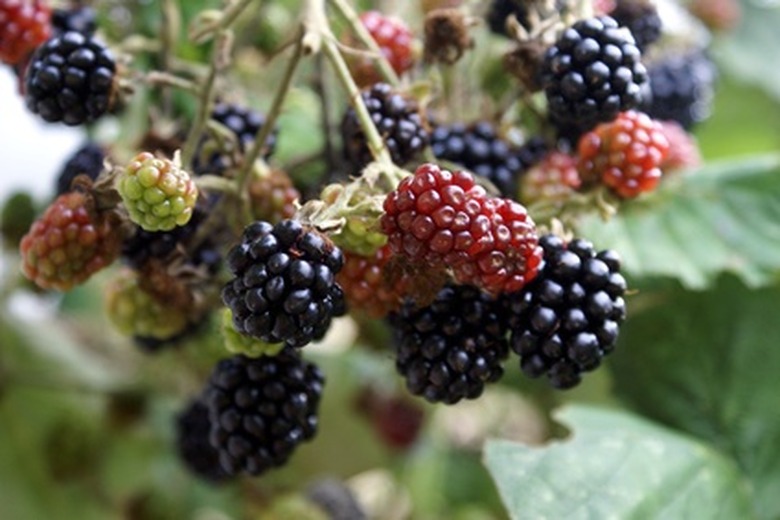How To Plant Blackberries In Georgia
Things Needed
- Organic compost
- Tiller
- Soil pH test
- Ground rock sulfur
- Limestone
- Water
- Shovel
- Pruning clipper
- Mulch
The blackberry is an easy-to-grow bramble that is tolerant of the climate and summer heat found in Georgia. Blackberry plants are easy to maintain and grow well in most well-draining soil types as long as they are provided adequate water. Blackberries are available in cultivars that grow in either a trailing or erect fashion. The erect cultivars are popular in Georgia home gardens as they require less growing space and maintenance. Plant blackberries in Georgia after the first frost in fall or once the soil can be worked in spring.
Step 1
Select a planting location for the blackberry canes that offers a well-draining soil and at least 6 hours of direct sunlight. Sandy loam soil works well for growing blackberries. In areas that have a high clay content soil, such as the Piedmont region in Georgia, blackberries should be grown in a raised bed that is 9 inches (or more) deep and filled with a well draining topsoil.
- The blackberry is an easy-to-grow bramble that is tolerant of the climate and summer heat found in Georgia.
- The erect cultivars are popular in Georgia home gardens as they require less growing space and maintenance.
Step 2
Amend the planting soil or raised bed at least one month prior to planting by working 3 to 4 inches of organic compost into the soil with a tiller. This will increase the nutrient value and water draining properties of the soil.
Step 3
Test the soil pH to verify it is 5.0 to 7.0. Add ground rock sulfur to the soil to lower the pH number or limestone to raise the pH number. Water the soil well and let it rest two weeks prior to planting.
Step 4
Create planting rows that are a minimum of 4 feet apart. Dig a planting hole that is 2 to 3 inches deep and wide enough to accommodate the roots. Set the plants into the hole and spread out the roots. Cover the roots with soil and pack to hold the canes in place. Space the plants 2 feet apart.
- Amend the planting soil or raised bed at least one month prior to planting by working 3 to 4 inches of organic compost into the soil with a tiller.
- Water the soil well and let it rest two weeks prior to planting.
If the canes you plant come from the nursery with dry roots, soak the roots in water for several hours before planting the canes.
Step 5
Water the canes well after planting to stimulate root growth. Cut the canes off to a length of 4 inches to promote new branch growth.
Step 6
Apply a 3 to 4 inch layer of mulch around the canes to hold water in the soil and prevent weed growth. Use straw mulch that is seed-free or clean pine bark to prevent weeds growing in the mulch.
Step 7
Water the blackberry plants each week with one inch of water during the growing and fruiting season. Do not allow the soil to dry out as this will inhibit fruit production.
- If the canes you plant come from the nursery with dry roots, soak the roots in water for several hours before planting the canes.
- Water the canes well after planting to stimulate root growth.
Tip
Cultivars that grow well in Georgia are Ouachita, Navaho and Arapahoe. The Brazos cultivar grows particularly well in south Georgia. Plant the blackberry canes in an area that was not previously used to grow tomatoes, potatoes, peppers or eggplants, as they produce a fungus that will damage blackberry canes. Fertilize blackberry plants after the first year of growth with a 10-20-10 fertilizer.
